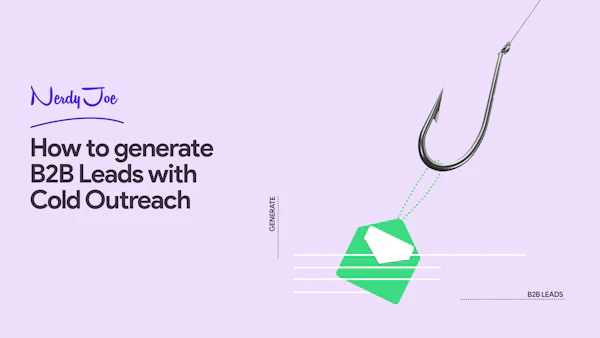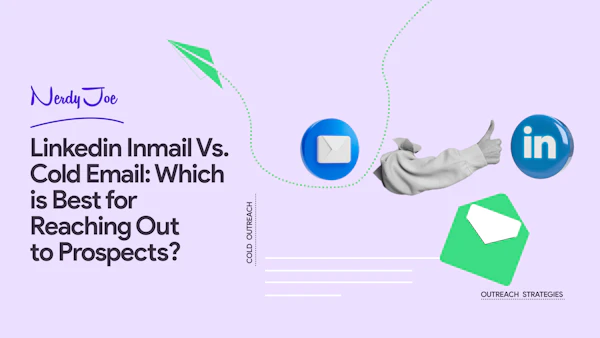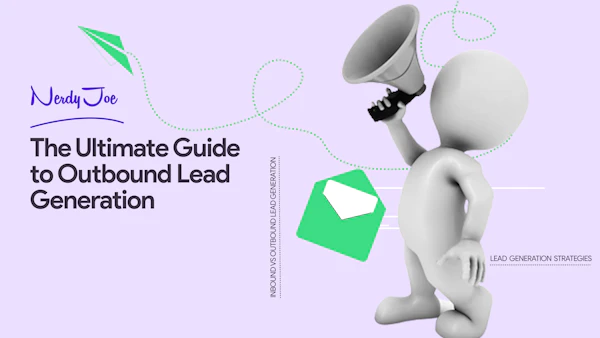Whether you’re a B2B or B2C company, picking the right lead generation agency among the countless agencies that exist is not always easy.
That’s mainly because:
There might be some confusion as to how some agencies define “lead.”
Most agencies are both expensive and inexperienced, and their results can’t cover your costs.
The majority of lead gen agencies market “job-to-be-done” (i.e., Send 5000 emails per month) versus selling outcome (i.e., We generate 10 leads for you per month).
When on the market for the best lead generation agency, you want to make sure the agency you’re bringing in has a track record of solving similar issues, and they can drive qualified leads toward your sales teams.
In this article, we’ll cover the mistakes most companies make when hiring agencies and how to find the best one.
Note: Struggling to get replies or book meetings with prospects that fit in your ICP? We’ll help you get 6 SQLs or book 6 meetings with prospects that are ready to buy for only $999/month. Book a 15-minute consultation now.
What YOU and lead generation agencies get wrong about working together
When outsourcing your client acquisition to a lead generation agency, it’s common to believe that it’ll be plain sailing and that soon you’ll be able to scale trials and demos.
But in actual fact, it is not always so straightforward. Here are some common pitfalls for agencies and clients alike and how you can avoid them.
Mistake 1: Wanting and promising results too fast
The majority of outbound lead generation agencies are great at promising to deliver results in a very short timeframe. Some even offer guaranteed leads from day one.
The reason for this is that you as a client make an investment and expect results much faster than is reasonable.
That’s a big mistake for many reasons:
Unless the lead generation agency you’re working with knew about your business in and out before the start of your engagement, it’s almost impossible for them to get you leads from Day 1.
Every company has its unique buyer’s journey and sales cycle — so is yours. And so even if your lead generation agency has a proven process, the chances it applies to your specific case are really thin.
The nature of your product or service can affect how fast you see tangible results in your outbound lead generation.
For instance, business to business purchases involve several decision-makers who can influence the purchase decision. And because of this, selling services and products to B2B clients can require long sales cycles.
So, it stands to reason that for such companies it can take much longer to fully benefit from lead generation services.
Mistake 2: Adopting a one-size-fits-all approach for everything
There is no off-the-shelf solution for lead generation.
Each product solves a specific problem in a slightly different way and each company has its own audience that is slightly different from others.
That said, even products that address the exact same problem may do so with different features, making each "competing" product cater to a certain demographic, a certain niche, and a certain level of expertise.
And of course, this has a direct impact on the marketing strategy that the company should adopt.
Consider the difference between these two SaaS companies.
Company A: a self-serve SaaS product that has a free trial
Company B: an enterprise-level SaaS product that requires some installations and integrations.
Obviously, Company A’s lead generation activities might be more channel-focused with the aim of driving traffic to its free trial page.
Whereas Company B's strategy would be much more suited to longer-term lead nurturing, account-based marketing (ABM), and more emphasis on outbound activities.
So, avoid working with lead generation agencies that have proven processes that they think may work for your business.
Of course, some of their processes may apply to your business, but that’s after they listened to you and got to know your business in and out.
Mistake 3: Not getting aligned as to what success metrics should be with your lead generation company
Success metrics make it possible for your team to gauge in a quantifiable and predictable way your progress and the results of the cold email agency you outsource to.
By setting metric-based goals, you can evaluate your lead-to-close rate, your lead-to-prospect rate, your time-to-close rate, and most importantly, your revenue per lead.
Here’s how you can calculate each of these.
1 - Lead-to-prospect rate
Lead-to-prospect rate is the percentage of leads that move on to become prospects. In general, there is confusion between a lead and a prospect.
Understand that a lead is an unqualified contact, while a prospect is a qualified contact that you have walked through your sales qualification process to determine if your company's products or services are suitable for their needs.
Here’s the formula you need to calculate your lead-to-prospect rate:

2 - Lead-to-close rate
The lead-to-close rate represents the percentage of leads that are eventually converted into customers. This is the most basic, yet the high-level view of the quality of the leads from your lead generation agency.
Here is the simplest formula for calculating your lead-to-close rate.
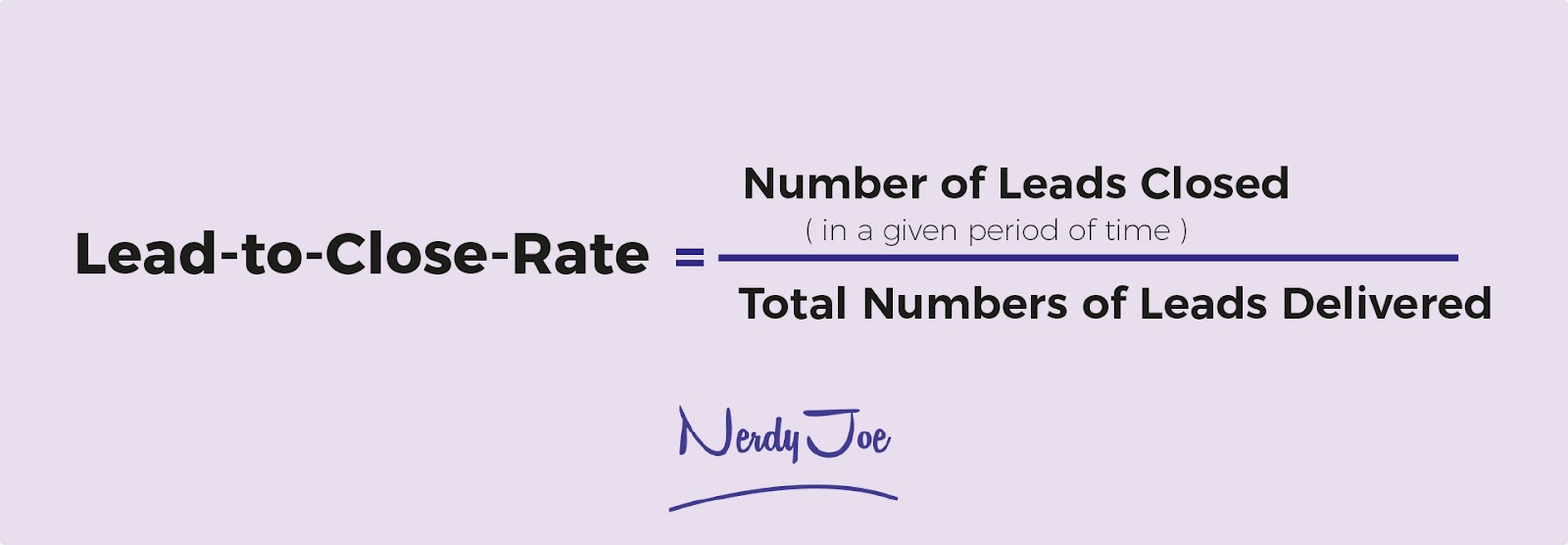
Note that a "good" lead-to-close rate varies substantially by industry and that a sub-par performance can be attributed to a variety of factors other than lead quality alone.
3 - Time-to-close rate
The time-to-close rate is the average time it takes for a lead to turn into a buyer. Like many other metrics, it is useful to calculate and compare the time to close between different campaigns.
Here’s a formula.

Time-to-close is critical in that it gives you a good indication of where a prospect is in the sales process — it is obvious that those further along in the process will have a shorter closing time.
Picking up leads that are further along in the sales process benefits the company in terms of cash flow and saves time for the sales team.
4 - Revenue per lead
Revenue per lead is the revenue derived from a set of leads divided by the total number of leads.
It helps answer the most crucial question about lead generation: are these leads really worth the investment?
Here’s how you can calculate your revenue per lead.
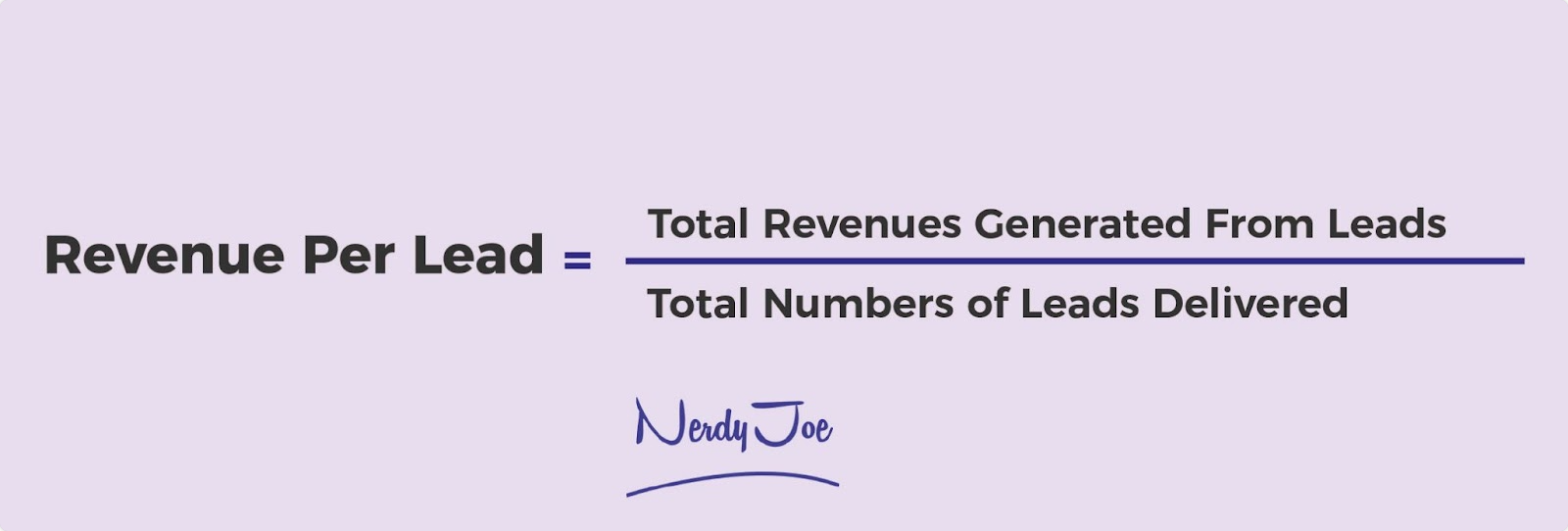
Mistake 4: Having the agency and the client’s sales and marketing teams work
Traditionally, the sales and marketing teams used to work in silos — segmented from each other. While the marketing team handled the top of the funnel, the sales team would handle the bottom of the funnel.
When a prospect was deemed sales-ready, they would be passed on to sales, and in many cases, such prospects would never hear from marketing again.
In other words, marketers use a lead generation strategy to generate leads, nurture and turn them into qualified leads, then pass them along to sales teams, and that's it.
Unfortunately, this linear process is no longer possible in today's world. Especially not when you outsource lead generation.
If you ever hope to get optimal results, not only do your sales and marketing teams need to work collaboratively, but they also need to align with your lead generation agency.
Why?
Because they all have the same goal of driving sales and revenue.
It all goes from a lead generation strategy to get more leads — based on a well-defined target audience — to an (email) marketing funnel for nurturing leads and a sales funnel to convert leads. They are all related.
So, it is crucial to keep them in sync for better communication and collaboration and clear lead generation goals.
The lead generation agency might need to talk to a few of your customers to better their ideal customer profile.
When you succeed in uniting your sales, marketing, and outsourced lead gen teams' around a single revenue cycle, they will drastically improve marketing return on investment (ROI), sales productivity, and, most importantly, top-line growth.
When do you need a lead generation agency?
Every company needs to grow, but not all of them need to resort to lead generation agencies.
You need a lead generation agency when:
You want or need to focus on booking appointments (through cold calling or cold email); or
You have steady growth but want a proven methodology to double down on generating leads. In other words, you’re not in a “get 10 MQLs or die” mode; or
You have the resources, you are ready, and you need lead generation specialists to try and understand how your audience thinks; or
You’re thinking long-term relationship with your audience; and/or
You want and are ready to trust your led generation agency with the strategy they come up with.
You had no prior digital marketing or online marketing strategy and lacked sales qualified leads.
You want to increase sales steadily through lead generation efforts and build a base of loyal customers.
Note: Struggling to get replies or book meetings with prospects that fit in your ICP? We’ll help you get 6 SQLs or book 6 meetings with prospects that are ready to buy for only $999/month. Book a 15-minute consultation now.
You’re not ready to resort to or don't need a lead generation agency if:
You don’t know exactly how many leads you need to sustain your year-over-year growth; or
You have crazy expectations; or
You are in dire need of marketing qualified leads to keep running your business; or
Your service or product is broken; or
Your positioning is broken; or
You expect the agency to do everything; or
You have a dedicated and experienced team of experts working full-time on lead gen;
You want blog post content marketing, search engine optimization, and creating content for your social media platforms.
10 smart questions to ask a B2B lead generation agency
As mentioned above, choosing and hiring a lead generation agency to outsource to can be a tough decision.
And for that matter, if your priority is cold emailing, the choice can be even tougher because if you hire the wrong agency, you are going to lose money.
To avoid that, here are some questions you need to ask before closing the deal.
1 - What’s their definition of a lead?
Maybe for you, a lead is when someone shows an interest in your product. Or maybe when they reach out directly to your sales and ask for the product.
Lead generation experts might have a different definition. Maybe for them, any person that downloads something or does something as little as clicking on a link is a lead.
So, make you clarify what a lead is and that you both agree on what success would translate into.
2 - Do they specialize in your niche?
It applies to every type of digital marketing and lead generation as well.
It’s always easier to generate leads from a specific target market when you already know you already know how to speak to them, how to find leads and build lead lists or prospect lists, the right sales funnel, the email marketing approach, etc.
That’s why niche experience matters.
Your lead generation experts' experience in your niche can make the difference between the quality and the lifetime value they provide your business and what you get from other agencies.
3 - How do they ensure high-quality leads?
The hardest part of lead generation is to ensure a quality prospect list in the first place.
Scrapping a list of lead gen tools and sending hundreds of emails per minute is not the way to go. Having a lead generation partner who can search for your potential customers and build quality lead lists is priceless.
So, talk to your target lead gen company and ensure they have a reliable way of getting leads. Also, make sure that the way they acquire leads aligns with your business.
4 - What’s their marketing philosophy?
How do they target customers? Are they aggressive in their messaging?
Are they in it to simply advertise your products or do they painstakingly create outreach sequences that offer value to the recipients before asking them to take an action?
5 - How do they report to clients?
You will want to know how your B2B lead generation agency is cooking things up to bring customers. So, you will want to know how often they report and what they report on.
6 - Does the lead generation team source or purchase leads through another company or are they generated in-house?
The way your target lead gen company generates leads is indicative of the quality of the results you get. Companies that purchase lists are basically sending emails to random people.
They’re simply through rocks at a wall to see what sticks. That’s not what you want. You need your lead gen company to properly conduct research, identify your ideal customer profile and build quality lists.
7 - Does the lead generation team comply with data protection laws?
There are lots of spam laws out there in almost every aspect of digital marketing. Most laws differ from one location to another.
You don't want to generate leads and wind up paying fines. Discuss and ensure that they abide by the different laws that pertain to your target audience.
8 - How much (and when) do they charge for their service?
Whatever service they promise, there won’t be any leads generated if you can’t afford them. So, you’ll also need to know how much they charge for the service and how that fits into your budget.
9 - What’s their plan to ensure your ROI?
So do they ensure you get a good ROI? You may be able to quickly see the value you get.
For example, you can easily see that generating 4 paying customers will make up for your investment.
But you’ll also need to figure out whether it is sustainable for you budget-wise. Also, they may not be able to deliver every month. Still, you pay. So, what happens then?
10 - Do they use your mailbox for outreach?
So, will they be using your mailbox for the outreach or use one of their own? You also have to figure that out.
Will they be sending emails that indicate they are third-party outreach specialists or will it feel like it is your organization reaching out to them?
Note: Struggling to get replies or book meetings with prospects that fit in your ICP? We’ll help you get 6 SQLs or book 6 meetings with prospects that are ready to buy for only $999/month. Book a 15-minute consultation now.
How to hire a lead generation agency: red flags to look out for
Here are a few red flags you’ll need to avoid when looking for or working with a lead generation company.
Poor reporting
Poor reporting will hurt the collaboration. Your target lead generation agency needs to specify KPIs and metrics and establish a reporting frequency.
After all, if you invest in something, you deserve to know how it's going and what the return on your investment might be.
Poor communication
You need to have frequent communication with your lead generation agency.
This can be about figuring out new approaches, getting updates on strategy adoptions, discussing engagement and results, and more.
You need to have a routine-based conversation to ensure everything is going well.
This is what gives you visibility into their work and everything else.
Poor communication will leave you in the dark. So, make sure you have clear communication before getting started together.
No documented process
You don’t want to work with an agency that is just figuring things out. That's one of the main reasons most people struggle to work with digital marketing companies.
Plus, it's a clear lack of professionalism and a no-no for you if you want serious, predictable results.
No proven results
It can be hard to sell intangible services like lead generation and we get it. But you need to ensure your target B2B lead generation agency has already achieved the results they’re promising you at least once.
No clarity as to when to expect the results
This might not be a specific date, but you’ll need a timeframe to work with.
You can possibly expect results for ages while you need ROI to grow your business. So, make sure you get clarity as to when you’ll be getting results.
Why the first 30 months of the relationships are so crucial to the lead gen campaign's success & how we work with our clients at Nerdy Joe
Week 1: Onboarding
Our services are productized and self-served — meaning we won’t have hours of back and forth.
We basically have several plans and once you choose the one that fits your current needs and budget, you’ll be taken to a cart where you can purchase the plan.
After that, you’ll get an invoice plus a welcome email. We will give you access to a Basecamp Project. That’s basically where we’ll collaborate and communicate on the to-dos and the campaign results.
Once in the project, we’ll have an asynchronous conversation that’ll help us know more about your business and your ideal customer profile, and target companies.
Those will be done within Day 1 and 2 of onboarding.
During those days, we’d aslo assign you some to-dos like purchasing a domain, giving us your domain credentials, and setting up your DKIM, DMARC, etc.
We can basically set up those but if you prefer, we’ll leave it to you. We’ll also start warming up your domain before we launch the campaign.
Between Day 3 and Day 5, we’ll identify and define your ideal customer, start profiling the ideal people to reach out to, and once you validate the list, we’ll go on and find their email addresses and research each account and add the email opening lines.
We’ll also write the cold email copy based on your tone of voice, brand messaging, and style guide.
Outcomes at the end of week 1
Domain name set up.
DKIM, DMARC, SPF, etc., set up.
A working list of prospects to reach out to.
Each account is researched and there’s enough information to personalize it.
The email copy for the campaign is ready.
The domain is being warmed up.
Week 2: Implementation
In the first days of week 2, we start by making sure everything is in place, that we’re aligned in terms of messaging and that everything about each account is correct.
We also launch a first pilot campaign with some prospects from our list to test our copy, messaging, and setup.
Based on data from that pilot, we identify room for improvement, iterate, and revamp our setup before we deploy the entire campaign.
Note: It sometimes happens that we hit our goal with that pilot campaign. For instance, if the plan you chose is for us to book 3 meetings for you per month, it may happen that we hit this goal with the pilot.
In this case, you can either upgrade your plan or we pause until the next month to continue the campaign (in the event you renew your plan).
Starting from Day 3, we deploy the campaign at scale — leveraging our learnings and results from the pilot. We also start monitoring results and some important metrics like clickthrough rate, reply rate, and bounce rate.
We basically want to make sure the metrics are circa our benchmarks and that we’re getting everything right.
Meanwhile, we also keep working on your target customers’ list, the account personalization, and follow-up emails.
Outcomes at the end of week 2
The open rate of above 50%
Reply rate averaging 20 - 25%
Monthly goal hit or halfway achieved
A bigger prospect list
Some early campaign results
Note: Struggling to get replies or book meetings with prospects that fit in your ICP? We’ll help you get 6 SQLs or book 6 meetings with prospects that are ready to buy for only $999/month. Book a 15-minute consultation now.
Week 3: Iteration
Week 3 is usually when we start to see results. I mean, CONSISTENTLY. We use the statistics and findings from the first two weeks to iterate the messaging, targeting, offer, and calls to action.
We then launch the campaign at scale and work to achieve our campaign goals.
We intentionally aim to hit our goals in Week 3 to avoid last-minute pressures but also to prepare for the next month's campaign.
Outcomes at the end of week 3
At this point, we certainly hit our target
Monthly strategy call
Campaign wraps up
Week 4: Wrapping up
The fourth week is when we try to wrap up the campaign and prepare for the next month's campaign.
It depends, of course, on whether you approach and confirms your plan for the following month.
Preparing for the next month allows you to save time on certain tasks and maximize the results.
For example:
We will keep warming up your domain
We'll extend your target list
We'll segment the list
We'll research the leads in advance
And more.
But in case you don't want to continue with your subscription, we just hand you the previous campaign material and call it a month.
Note: Struggling to get replies or book meetings with prospects that fit in your ICP? We’ll help you get 6 SQLs or book 6 meetings with prospects that are ready to buy for only $999/month. Book a 15-minute consultation now.
Key Takeaways
Whatever the lead generation company you decide to work with, your first 30 days will determine how everything plays out eventually. So, it’s always a great idea to stay patient for the first month and record the red flags you see and whether or not they’re a fit for your needs.
Keep in mind that hiring a lead generation company always comes with some uncertainties. Your goal in the hiring process is to ensure that both parties have clear and realistic expectations about the other.
Always make sure you ask the right questions before you sign off on a deal with your lead generation company. This is important for ensuring you stay on the same wavelength throughout your collaboration.
Note: Struggling to get replies or book meetings with prospects that fit in your ICP? We’ll help you get 6 SQLs or book 6 meetings with prospects that are ready to buy for only $999/month. Book a 15-minute consultation now.

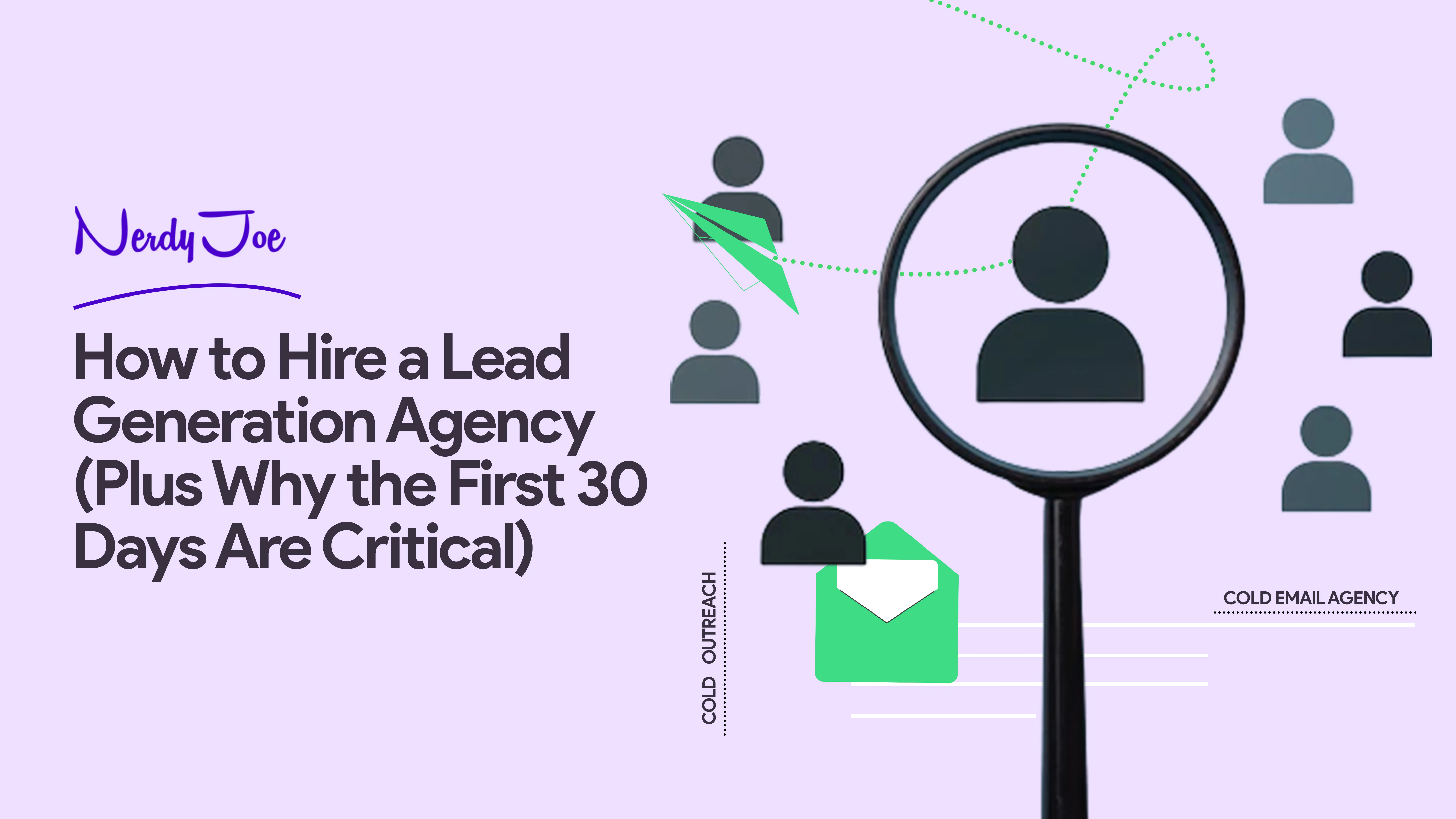

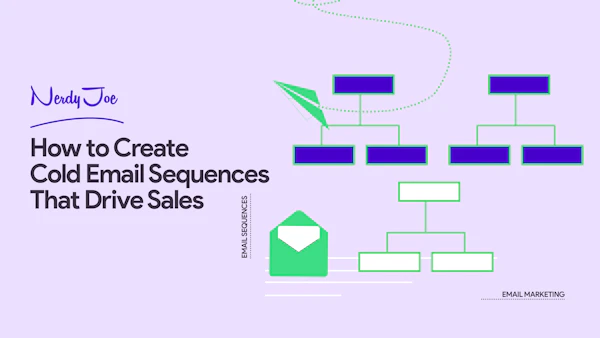
![top b2b lead generation companies and services in 2023 [in-depth review]](https://www.datocms-assets.com/66765/1674066909-top-b2b-lead-generation-companies-and-services-in-2023-in-depth-review-3x.jpg?w=600&h=400&fm=webp)
